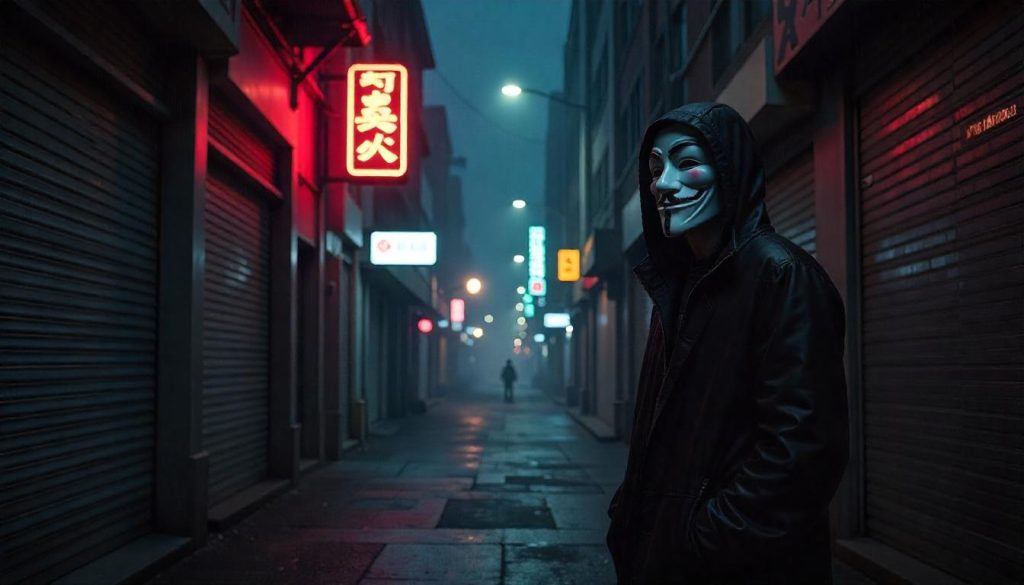There’s a question that’s followed me for years, one I’ve never truly answered out loud until now: “Does Anonymous ever reveal their identities?” It’s a strange question—like asking a shadow if it ever steps into the light. But since you’re reading this, I’ll try to give you an honest answer, not as some mythologized hacker in a mask, but as someone who’s lived the double life that comes with being part of Anonymous.

Let’s start with the truth: the name “Anonymous” doesn’t belong to any one person. It’s not a membership you sign up for. It’s a banner. A mask. An idea. Anyone can wear it. And anyone can take it off. That’s both the beauty and the danger of it.
⛓️ The Importance of Anonymity
The power of Anonymous lies in its name. Anonymity protects us. It allows us to speak without fear, to act without being hunted, to protest without losing our jobs or our freedom. For many of us, our identity is our greatest weapon—and our greatest shield. Governments fear us not because we are many, but because we are faceless. A face can be targeted. A name can be silenced. But a mask? A mask can be worn by millions. So do we reveal ourselves? Usually, no. Because the second you do, you’re not Anonymous anymore. You’re just a person. Vulnerable. Trackable. Breakable.
🕵️♂️ But… Sometimes, Yes
Now for the uncomfortable truth: yes, there have been times when some people have revealed their identities, intentionally or not. Sometimes it’s ego. A hacker pulls off something big and wants the credit. So they talk. Maybe to a journalist. Maybe in a dark corner of the internet. Maybe to a friend who talks too much. That’s how it starts.
Other times, it’s betrayal. Not everyone in Anonymous shares the same motives. Some are idealists, others are opportunists. A few are informants. Law enforcement agencies have made a career out of infiltrating our networks, flipping people, and outing key figures. The FBI, Interpol, and other cybercrime task forces have arrested members in the U.S., UK, Turkey, and beyond. Sometimes, the price of a face is prison.
And then there are the rare few who come forward willingly—not for fame, but for cause. To take ownership of a message. To use their real names to amplify a protest or campaign. These are the bravest—and often the most endangered—among us.
🌐 High-Profile Examples
You’ve probably heard of Barrett Brown. He was once a journalist, activist, and unofficial spokesperson tied to some Anonymous operations. He didn’t hack. He didn’t break into anything. But he talked. A lot. And he was eventually arrested and imprisoned—not just for what he said, but for what the government claimed he represented. Then there’s Hector Monsegur—also known as “Sabu.” He was a key figure in LulzSec, an offshoot of Anonymous. After his arrest, he became an FBI informant and helped bring down several other members. Some called it betrayal. Others saw it as survival.
These stories remind us: revealing your identity, whether by choice or mistake, comes with consequences.
📡 Why Stay Hidden?
For many of us, staying anonymous isn’t just about protecting ourselves. It’s about protecting the idea. Anonymous was never about individual fame. It was about collective action. When you know you won’t get credit, your actions become purer. Less about self. More about the cause. It also ensures resilience. If one of us falls, the movement continues. You can’t arrest an idea. You can’t kill what you can’t see.
🚧 The Risks of Being Unmasked
Let me be blunt: if you choose to unmask yourself, willingly or not, you invite trouble. That could mean:
-
Legal action: Most countries take cybercrime seriously. Even DDoS attacks can land you years in prison.
-
Doxxing: Exposing your identity online can lead to harassment, threats, and attacks against you and your family.
-
Surveillance: Once you’re known, you’ll be watched. Phones tapped. Devices compromised. Friends questioned.
-
Loss of purpose: Once you step into the light, you’re no longer Anonymous. You’re a person with a face and a past. That changes everything.
🎭 Anonymous is Bigger than Any One of Us
I know this may sound contradictory, but some of the most effective members I’ve known never even touched a keyboard. They made posters. They organized protests. They spread messages online. They wore the mask in public—not to hide, but to be seen as part of something larger. It’s not always about hacking. Sometimes it’s about hope. So do we ever reveal our identities? Occasionally, yes. But most of us choose the mask, not to run from responsibility, but to shield the truth from those who would distort or destroy it.
🌱 The New Generation
Today, Anonymous is evolving. It’s not the same as it was in 2008 or 2012. The people change. The tools change. The targets change. But the idea remains. New voices rise up. Many don’t even call themselves “Anonymous.” And maybe that’s the point. Because in the end, the mask is a mirror. When you wear it, you’re forced to ask: What do I stand for? What am I willing to fight for, even if no one ever knows it was me?
📌 Final Thoughts
Does Anonymous ever reveal their identities? Yes, some do. But most don’t. Because it’s not about fame. It’s not about being a hero. It’s about being a part of something bigger than yourself. Something that doesn’t need a name or a face to matter.
We are Anonymous.
We are Legion.
We do not forgive.
We do not forget.
Expect us.